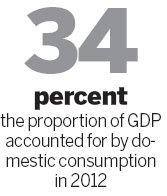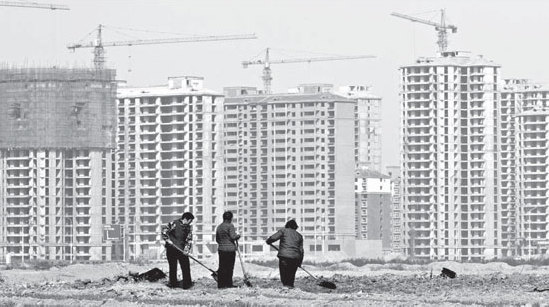Adviser upbeat about rise in economic growth
Updated: 2013-03-06 07:50
By Chen Jia (China Daily)
|
||||||||
|
Farmers prepare to plant spring crops amid spreading urbanization in Huaxian county in Henan province. An Xin / For China Daily |
Income redistribution, rural labor transfer key to 'fast development'
China's income distribution reform and the transfer of rural labor can bring back and retain economic growth at an annual rate of higher than 8 percent in the next 20 years, a senior policy adviser said.
"A stronger reform momentum will lead China's economy away from a hard-landing risk in 2013 and sustain high-speed growth in the long term," said Zheng Xinli, vice-chairman of the China Center for International Economic Exchanges, a government think tank.
He said he expects that the year-on-year economic growth rate may improve to better than 8 percent this year, rebounding from a 13-year low of 7.8 percent in 2012.
"Some economists say that China has entered a 'medium growth speed'. They have ignored that the huge domestic consumption market and plentiful labor force freed from the rural areas will support the next period of fast development," said Zheng.
A report from the World Bank said that the labor shortage will be a major constraint to China's economic growth in the coming years. "But as I see it, the estimate will not come true for at least 20 years," Zheng said.
"About 70 percent, or 200 million, of the rural labor will move into cities in the next 20 years, shifting to the industrial and service sectors."
This will be a path to achieving integration of urban-rural areas and promoting the development of modern industry, the economist said.
As a former leader of the Policy Research Office for the Communist Party of China, Zheng has participated in designing the country's most important reforms in the past 20 years.
Zheng was also one of the drafters of the premier's annual government work reports in the past decade.
Based on Zheng's research, domestic consumption accounted for 34 percent of the total GDP last year, dropping from 38.5 percent in 2011. It was even 23 percentage points lower than the rate in 1985.
"The biggest problem is the existing unreasonable income distribution system, which has depressed residents' purchasing power and enlarged the wealth gap between the rich and poor," he said.
"The top priority for income reform is to expand the middle-income group."

The reform measures may be "neutral" for the middle tier, but the number of people and income amount should be controlled for the wealthy group, according to Zheng.
"A more balanced income distribution structure is expected to drive up residents' consumption rate by 10 to 15 percentage points, which means an expansion of more than 7 trillion yuan ($1.12 billion) of consumption goods and services can help improve people's living standards."
The State Council, China's cabinet, released an initiatory income reform plan on Feb 3, without disclosing any details.
According to the Party's schedule, the third plenary session of the 18th National Congress of the Communist Party of China will take place at the end of the year, when the congress is expected to discuss concrete reform measures, not only the income distribution system, but the development transformation in areas like finance, healthcare and social security, Zheng said.
"Reform is the crucial driving force for China's economic development in the next 20 years," he said.
"The new government that will be elected during the two sessions should find out the main problems that handicap the economic growth pattern transformation and effectively solve them, which is the only way to stabilize economic growth and sustain long-term development."
Fast economic development will lead to moderately rising prices, but the potential inflation pressure will be under control, Zheng said.
"People always say that inflation is like a tiger in a cage, and the government's macroeconomic policy is able to keep the tiger in the cage."
chenjia1@chinadaily.com.cn
(China Daily 03/06/2013 page16)

 In Photos: 7.0-magnitude quake hits Sichuan
In Photos: 7.0-magnitude quake hits Sichuan
 Li Na on Time cover, makes influential 100 list
Li Na on Time cover, makes influential 100 list
 FBI releases photos of 2 Boston bombings suspects
FBI releases photos of 2 Boston bombings suspects
 World's wackiest hairstyles
World's wackiest hairstyles
 Sandstorms strike Northwest China
Sandstorms strike Northwest China
 Never-seen photos of Madonna on display
Never-seen photos of Madonna on display
 H7N9 outbreak linked to waterfowl migration
H7N9 outbreak linked to waterfowl migration
 Dozens feared dead in Texas plant blast
Dozens feared dead in Texas plant blast
Most Viewed
Editor's Picks

|

|

|

|

|

|
Today's Top News
Live report: 7.0-magnitude quake hits Sichuan, heavy casualties feared
Boston suspect cornered on boat
Cross-talk artist helps to spread the word
'Green' awareness levels drop in Beijing
Palace Museum spruces up
First couple on Time's list of most influential
H7N9 flu transmission studied
Trading channels 'need to broaden'
US Weekly

|

|








